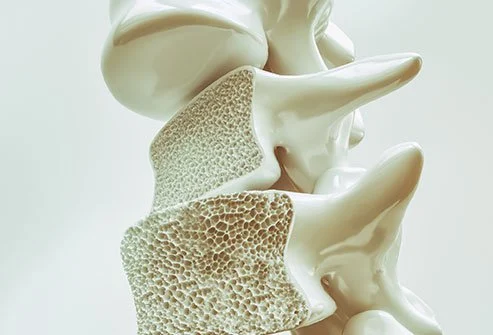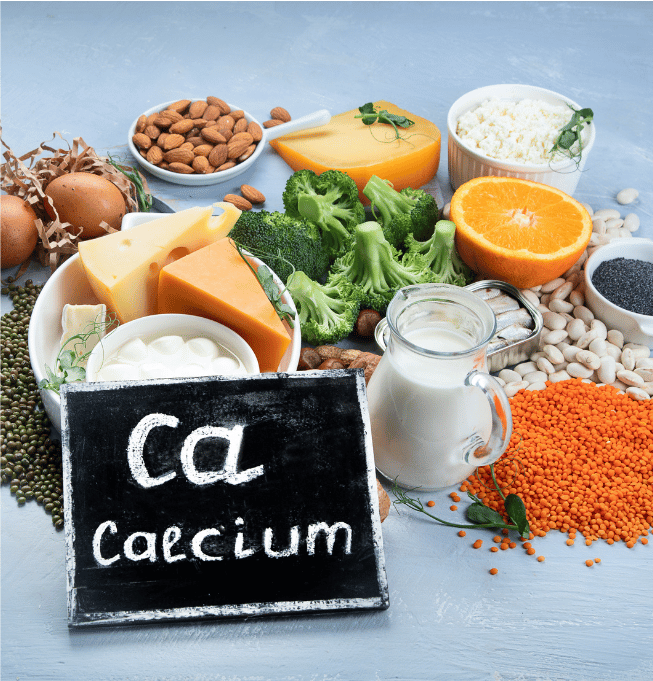Reverse Osteoporosis Through Diet
Osteoporosis is a silent but prevalent disease that affects millions of people worldwide. In this blog post, l explore the critical aspects of osteoporosis prevention and reversal through diet and lifestyle changes. Join me, Gillian Killiner, a world renowned registered dietitian with over 26 years of experience, as we delve into this essential topic that impacts the lives of millions.
Understanding Osteoporosis
Osteoporosis is a condition characterized by the thinning of bones, resulting in reduced bone density. Our bones consist of a matrix that resembles a honeycomb, and they need to be strong and flexible to support our bodies effectively. Most people will reach their peak bone mass between the ages of 25 and 30. By the time we reach age 40, we slowly begin to lose bone mass. However, various factors, including genetics, medications, lifestyle choices, menopause and aging, can lead to a decrease in bone density.

The Role of Bone Cells
Two types of cells primarily regulate our bone health: osteoclasts, responsible for breaking down bone tissue, and osteoblasts, which build new bone tissue. As we age, osteoclasts often outperform osteoblasts, leading to less stable and less dense bones, making them more prone to fractures.
Lifestyle Changes for Stronger Bones
In the UK over 3 million people are estimated to have osteoporosis and there are estimated to be over 500,000 fragility fractures that occur in the UK each year. This does not have to be the case. Ensuring proper bone health involves making important lifestyle changes.
We know it can be challenging in our modern world, as it is not highly conducive to maintaining strong bones. But we all need to act. The figures are rising as more and more people are developing poor bone health at a younger age.
Below are a few key factors to consider:
1. Exercise to prevent Osteoporosis
It is SO easy to not get regular physical activity. We need to be active every day, and as we get older (30+) focusing especially on weight-bearing exercises and weight lifting, as these play a pivotal role in maintaining bone density. For years, cardio workouts were the go-to for fitness, but research has highlighted the importance of weight-bearing exercises, especially for women. Just 30 mins per day is a good way to keep bones happy.
2. Alcohol Consumption
While moderate alcohol consumption may offer some health benefits, excessive and regular drinking can negatively impact bone health. It reduces calcium stores, affecting calcium balance and weakening bones. Furthermore, frequent intake alcohol can also impair the production of vitamin D in the body. Vitamin D is essential for proper calcium absorption and utilization by bones. When vitamin D levels are inadequate due to excessive drinking, it further contributes to the negative impact on bone health and when alcohol is consumed in excess of food it can replace essential nutrients in your diet, further jeopardizing bone density.
3. Caffeine Intake
Who doesn’t love a Tea or Coffee! Caffeine is prevalent in various every day beverages and foods, including energy drinks, and desserts. Caffiene in safe amounts can keep you focused and helpful for stimulating your brain, muscles and bowel. However when we consume too much caffeine, it can interfere with our body’s ability to absorb calcium properly. High levels of caffeine lead to increased urinary calcium excretion, meaning that more calcium is being excreted out of the body through urine instead of being absorbed and utilized by our bones and muscles.
Over time, this disruption in calcium balance, caused by excessive caffeine intake, can have detrimental effects on our long-term muscle and bone health. Inadequate levels of calcium can weaken bones and increase the risk of fractures or osteoporosis. Additionally, insufficient calcium availability for muscles may lead to decreased muscle strength and endurance.
- Sourdough and Milk Chocolate Flavour: A smooth blend with a touch of caramel sweetness for a rich and full of flavour cup
- Swiss Water Decaffeination Process: Naturally decaffeinated without chemicals, preserving the unique flavour characteristics of the coffee
- Smooth and Caramel-Sweet, Roast 4: A balanced medium-dark roast that delivers a satisfying, full-bodied cup without the caffeine
- Fairtrade and Organic certified: Ethically produced coffee that supports sustainable farming and empowers local communities
- Roasted in Meltham, Yorkshire with stubborn attention to detail for consistently great taste
4. Sodium (Salt) Consumption
Salt is a common ingredient in many processed and hidden foods. Consuming a diet rich in processed foods, takeaways, and fast food can lead to excessive salt intake. Calcium homeostasis is essential for maintaining healthy bones and overall bodily functions. The body tightly regulates calcium levels through a complex interplay between various hormones and organs. However, excessive salt intake can disrupt this delicate balance.
Research suggests that high salt intake can stimulate the secretion of PTH from the parathyroid glands. PTH acts on the bones to release stored calcium into the bloodstream, thereby increasing blood calcium levels. This process is known as bone resorption or turnover.
When bone turnover is increased due to elevated PTH levels, it can lead to accelerated bone loss over time. This puts individuals at a higher risk of developing osteoporosis or other related bone disorders. Moreover, it may also contribute to an increased risk of fractures.
Nutrients for Strong Bones
I have for the past 15+ years been helping patients improve their bone health, osteopenia and osteoporosis. Recent research reassures us that it may be possible to rebuild bone density and achieve osteoporosis reversal through a combination of lifestyle changes, such as exercise and diet, and medical interventions. Menopause can be a time when bone decline accelerates and a diagnosis of osteoporosis can be a shock. I see many many ladies very upset and worried. There is much to do at this time so if you are reading this saying this is me – be positive and start making changes today.
To ensure your bones stay strong and healthy, consider incorporating the following nutrients into your diet:
1. Calcium
Calcium is a fundamental building block for bones, constituting 99% of bone mineral. Dairy products like yogurt, cheese, and milk are excellent sources of calcium. However, plant-based options such as tofu, tempeh, green vegetables, seeds, and nuts also provide this essential nutrient.

2. Vitamin D
Vitamin D is essential for calcium absorption into the bones. In regions with limited sunlight exposure, supplements may be necessary to meet your vitamin D requirements. You can also find vitamin D in oily fish, eggs, and certain mushrooms.
3. Zinc
Zinc, crucial for immune function, also plays a role in bone health. Incorporate zinc-rich foods like pumpkin seeds, meats, fish, and nuts into your diet to support both your immune system and bone density.
4. Protein
Protein comprises 50% of bone density and matrix. As we age, it becomes vital to ensure adequate protein intake, as older populations often consume less protein than their younger counterparts. Include high-quality protein sources in your meals to promote bone health.
Do remember our body needs a complete and varied nutrient rich diet so the above are only a scratch on the surface!
Conclusion – Osteoporosis
Osteoporosis is a widespread health concern, but by making informed dietary and lifestyle choices, you can take proactive steps to maintain and even improve your bone health. Incorporating all the nutrients essential for optimal health including ensuring you have adequate calcium, vitamin D, zinc, and protein along with regular exercise and moderation in alcohol, caffeine, and salt intake, can significantly contribute to stronger bones.
Do check out my other blogs and my videos on my YouTube channel covering various aspects of diet and health, so don’t forget to like, subscribe, and share my content. Until next time, take care!
Links included in this description might be Amazon affiliate links. If you purchase a product or service with the links that I provide I may receive a small commission.
